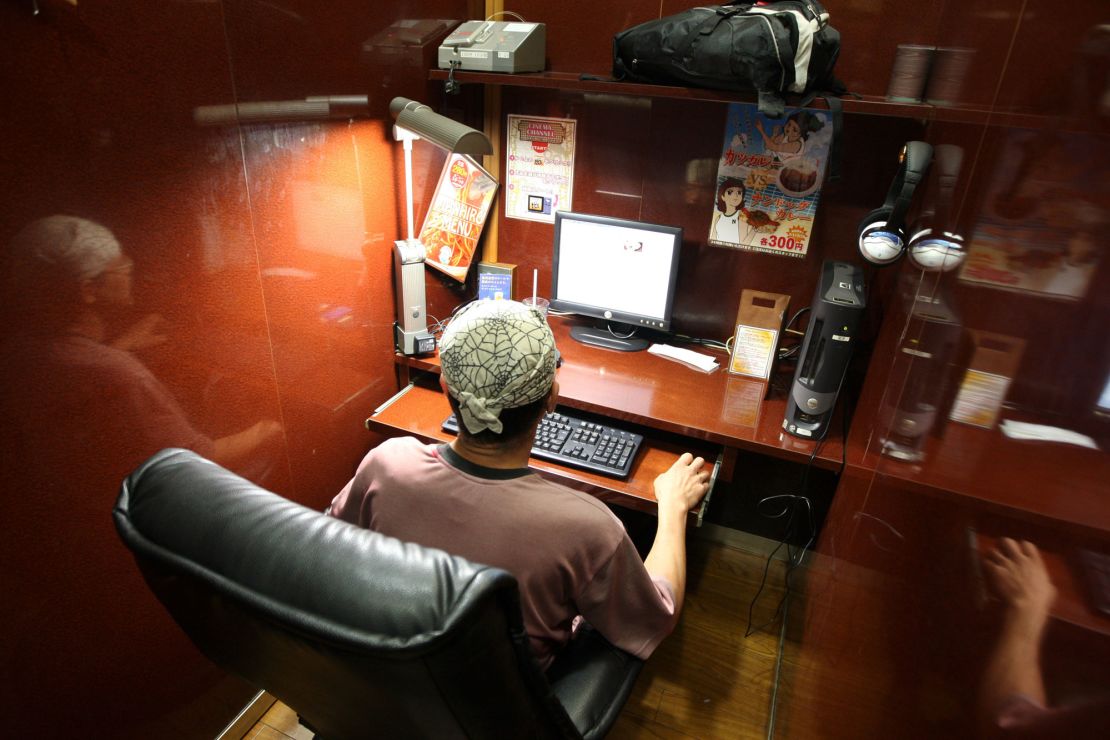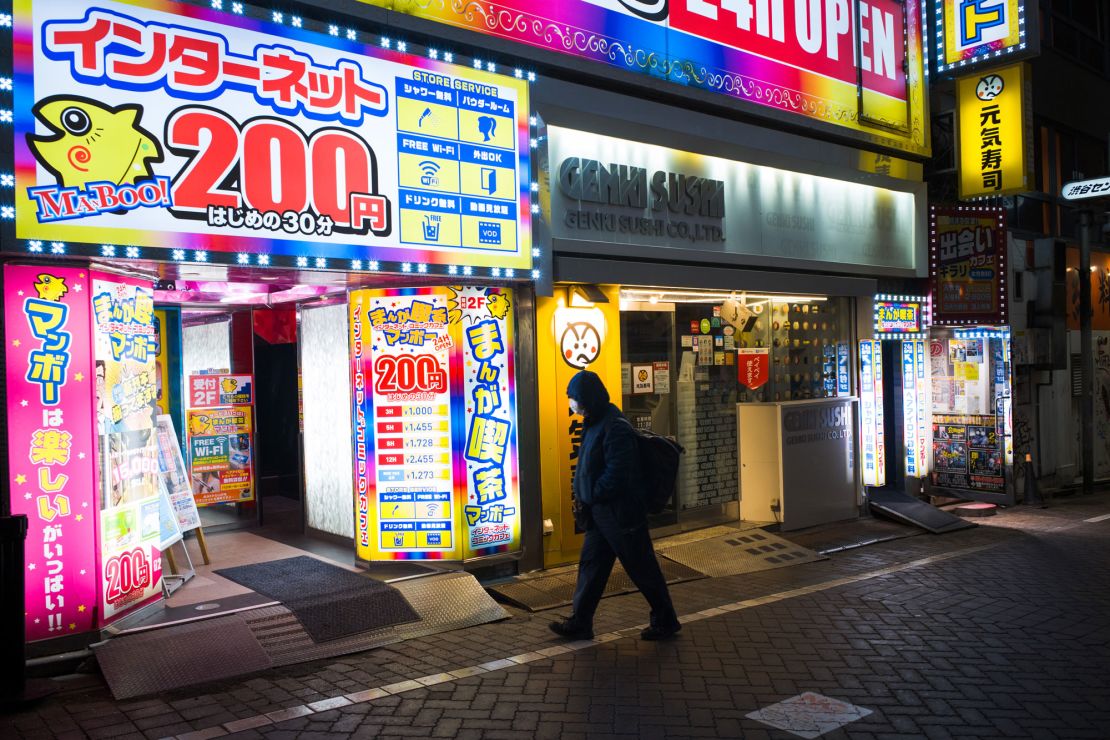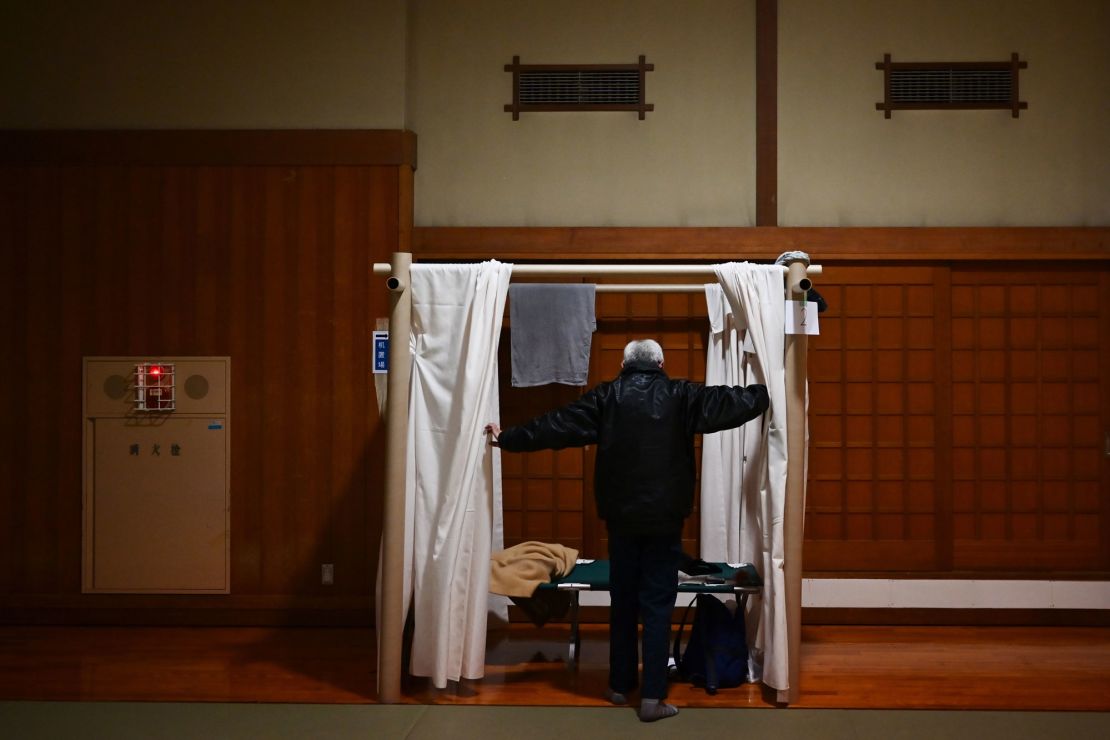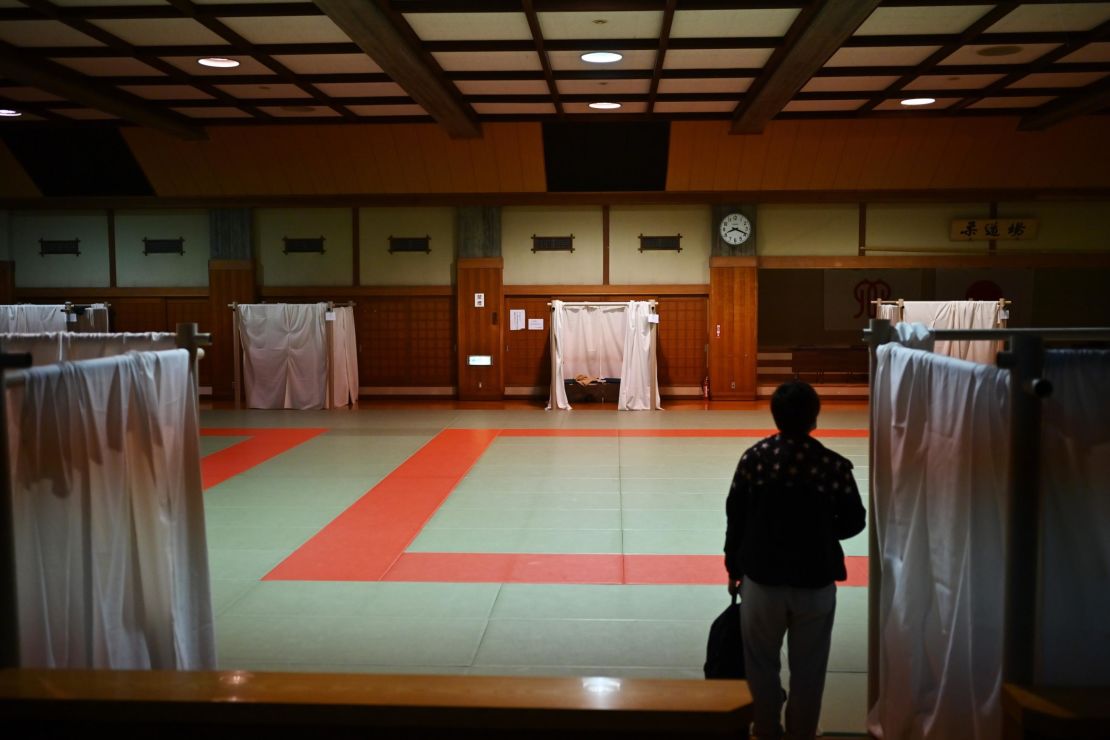Odd jobs on construction sites used to earn Takahashi enough money to pay for a private booth each night at one of Tokyo’s internet cafes. But Japan’s coronavirus lockdown not only cost him his work, it has temporarily closed the cafe that was his de facto home.
The 35-year-old has been sleeping rough at a Tokyo bus terminal for two weeks.
“Many companies have become bankrupt due to the pandemic. There are many people like me without jobs at the moment,” said Takahashi, as he waited in line in Shinjuku to receive a free meal from Moyai, a support group for the homeless.
Takahashi is one of Tokyo’s 4,000 “internet cafe refugees” – homeless people, mostly men, who before the pandemic usually paid between $17 and $28 to stay overnight in a 20 square foot booth in one of the city’s 24-hour internet cafes.
Over the past few weeks, Japan has scrambled to contain an uptick in coronavirus cases. As of Sunday, there were 14,571 cases nationwide and 487 deaths, according to Johns Hopkins University.
To stop the virus spreading, Japan called a nationwide state of emergency, which closed businesses including internet cafes, forcing their inhabitants to seek refuge elsewhere.
The Japanese authorities are providing emergency housing to support those living in internet cafes, but the pandemic measures have exposed a problem that goes back decades.
Becoming a place to stay
Although Tokyo has a reputation as a prosperous, high-tech city, it also has a community of 5,126 homeless people, according to figures released by the Tokyo metropolitan government in 2019.
Of those, 4,000 are internet cafe refugees, while more than 1,000 are unemployed and live under bridges and in cardboard boxes and tents in parks and along river banks. Charity groups believe the numbers could be much higher.

“People started using (internet cafes) as cheap alternatives to hotels. From there it gradually morphed into a sort of slightly exotic homeless shelter,” said Tom Gill, a social anthropologist at Meiji Gakuin University.
Open around the clock, many internet, manga and video-booth cafes across Japan provide showers, coin laundries, a cafe and most importantly – private booths with reclining chairs that can be rented on an hourly, daily or overnight rate, to sleep in.
Thin wooden partitions separate the cubicles and a long, narrow corridor divides one line of cubicles from another.
Prices vary from place to place, but 12 hours in a private booth can cost between 1,800 ($17) to 2,000 ($19) yen on weekdays, and as much as 3,000 yen ($28) on the weekends and on public holidays.
There are so many internet cafes in Tokyo that anyone can find a place to sleep on most nights.
Dream of better life
Over the past decades, Japan has seen a dramatic increase in part-time and temp workers like Takahashi – due in part to the partial legalization of temporary and contract work in 1986 and full legalization in 1999.
In 2019, Japan had 22 million part-time and temp workers, compared to 17 million in 2011, according to Japan’s Ministry of Internal Affairs and Communications.
Some of these workers don’t have jobs every day and are often paid the minimum wage – which is $9 per hour in Tokyo, compared to $7 per hour in the US and $11 per hour in the UK. Such workers found it harder to afford stable housing. In Japan, renters need to pay landlords upfront costs that include a deposit, key money and at least three months’ rent in advance.

Takahashi used to work as a day laborer in a shipbuilding yard in Hiroshima. But he made his way to Tokyo last November when he heard wages were better in the capital. The minimum wage in Tokyo is 958 yen ($9) per hour, compared to 818 yen ($8) in Hiroshima, according to the Japan external trade organization.
At the beginning, he found construction jobs in the capital. With his day’s wages, he opted to stay in different manga internet cafes, where he could browse through comic books after work.
As many as 15,000 people stay in these internet cafes a night in Tokyo – many are tired Japanese businessmen who have gone out drinking after work and missed the last train home. But others, like Takahashi, can’t afford a home.
Takahashi didn’t mind if the cafes were crowded. He rented a private booth that he accessed with a key card and kept to himself. He kept all his belongings in a rucksack, so he could move easily from cafe to cafe.
But everything changed when the pandemic hit.
The company he worked for went bankrupt. Takahashi heard of an internet cafe in Yoyogi park that only charged 200 yen ($2) for 12 hours and moved there.
But when that place shut, he had nowhere else to turn.
A different kind of homelessness
Internet cafe refugees have existed since the 1990s, but people don’t think about them when the economy was stable, as they weren’t sleeping on the streets, said Gill.
The coronavirus pandemic, however, “brutally exposed what is usually a concealed part of the Japanese economy,” he added.
On April 30, Hatanaka Kazuo, a spokesperson for the Tokyo metropolitan government, said the city’s authorities will provide internet cafe refugees with a room in a business hotel until May 6, when the country’s state of emergency is scheduled to end. That period, he said, could be extended if the state of emergency doesn’t lift.

To qualify, people need to present an internet cafe membership card or bring receipts to prove they have been living in internet cafes. Each Tokyo ward has an information counter where internet cafe refugees can seek advice. Before April 21, internet cafe refugees needed to have proof they’d lived in Tokyo for 6 months. On April 22, Tokyo scrapped that rule.
Since the declaration of the state of emergency in Tokyo on April 7, close to 700 people have moved into business hotel rooms provided by the local government. South of Tokyo in Yokohama city, officials have converted a martial arts hall into a shelter with small, private cubicles that have drapes to give privacy and respect social distancing rules.
Many internet cafe refugees were unaware of the help available as Tokyo officials had not widely publicized the scheme, according to Ren Onishi, the chairman of Moyai, the charity.

Earlier in April, Moyai launched a petition asking to use the athlete’s villages for next year’s Tokyo Olympics as a shelter for internet cafe refugees and the homeless. The petition has garnered 53,000 signatures so far.
Homeless people in Japan are often blamed for their situation, said Onishi. He hopes that the light the pandemic has thrown on the plight of the homeless and irregular workers in Japan might be a catalyst for change.
But given the social stigma around homelessness in Japan, many are too ashamed to seek help. Internet cafes give them basic shelter and anonymity. They ask few questions and accept cash payment up front.
“The anonymity is an advantage, if you don’t want your family, or your company to know where you are living, or if you are on the run from the law or loan sharks,” added Gill.
The disproportionally high number of men living in internet cafes is also due to conservative attitudes in Japan, Gill said.
Men with no obvious illnesses or injuries are generally blamed for ending up homeless, he said, suggesting that Japanese officials are more likely to have sympathy for women in the same situation and offer them more support.
With no clear end in sight for the pandemic, Takahashi hopes he will be able to find a job so he can save enough money to travel from Shinjuku to Hiroshima, where he can stay with friends.
Takahashi thought he wouldn’t qualify for a place in one of Tokyo’s business hotels as his home address was in Hiroshima, and he didn’t have the necessary paperwork.
“I’m try to endure these circumstances by thinking of it as a life experience,” he said.





















